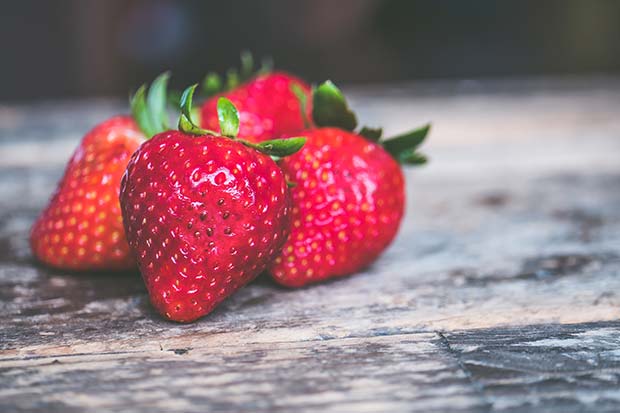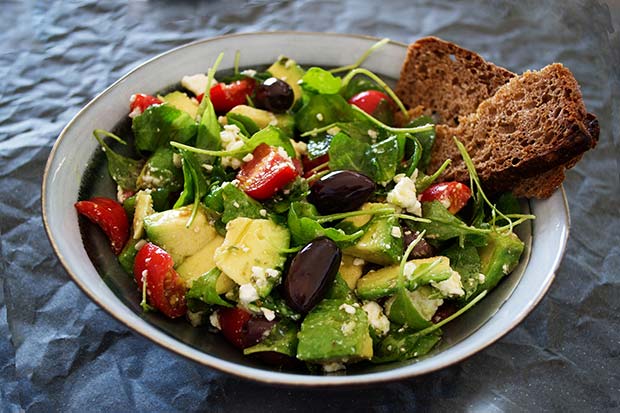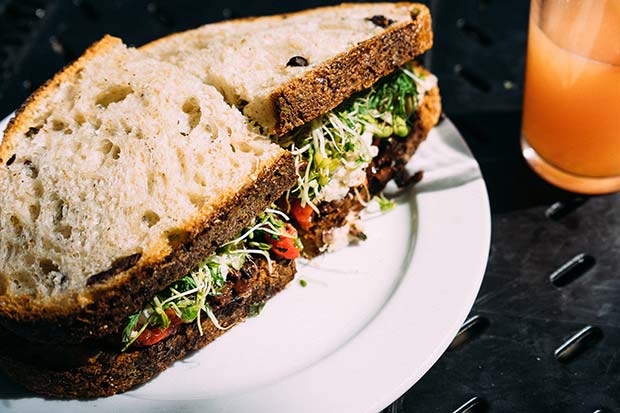The healthy living trend has gone viral like a social media craze, only bigger, and it’s spreading over into the independent retail sector. Two decades ago low, no, meat-free and free from alternatives were tacked on as niche products at the end of suppliers’ product lists. These days ‘healthy’ is where the action is for consumers and suppliers alike, and wholesalers and their independent retail customers need to catch up, or miss out on the biggest food and drink trend around.
 First off, the ‘plant-based’ sector’s growth shows no signs of slowing, with companies and brands ‘greening’ their portfolios to attract mainstream consumers wanting to add plant-based options to their diets. Plant-based has even caught the attention of the producers of the Great British Bake Off, which had a Vegan Week in its last season. Because they contain fewer saturated fats, vegan diets are proven to reduce heart disease risk, a further factor in their appeal.
First off, the ‘plant-based’ sector’s growth shows no signs of slowing, with companies and brands ‘greening’ their portfolios to attract mainstream consumers wanting to add plant-based options to their diets. Plant-based has even caught the attention of the producers of the Great British Bake Off, which had a Vegan Week in its last season. Because they contain fewer saturated fats, vegan diets are proven to reduce heart disease risk, a further factor in their appeal.
Next, as more consumers pay attention to health and sustainability, replacement foods and ingredients are rising in popularity, offering alternatives to bread, meat or dairy. The quest for different proteins has resulted in increased use of black beans, lentils, peas, rice, nuts, seeds, chickpeas and even insects, as seen when edible insect producer Eat Grub secured a Sainsbury’s listing.
These are the headline ‘healthy’ food trends. In drinks, the big news is that consumer concerns about alcohol and sugar consumption levels are spawning new segments with growth potential.
Coca-Cola European Partners (CCEP) was one of the soft drink manufacturers on the case well before the sugar tax came in. Amy Burgess is Trade Communications Manager at CCEP:
“Consumers are increasingly more in tune with their wellbeing and it’s affecting the way they shop, with ninety percent saying they’re influenced by health when shopping. As more people change their lifestyles to be healthier, sugar content is a major factor in their choices and they’re looking out for more low-sugar options.”
There’s a growing love of low and zero sugar soft drinks in their own right, a classic example being Coca-Cola Zero Sugar, Britain’s fastest growing cola brand.
 Flavoured waters are another part of CCEP’s portfolio reflecting this trend. The company recently introduced a new soft drinks tax-exempt range, Aquashock to their Oasis portfolio.
Flavoured waters are another part of CCEP’s portfolio reflecting this trend. The company recently introduced a new soft drinks tax-exempt range, Aquashock to their Oasis portfolio.
Appealing to young adults seeking excitement, Oasis Aquashock features ‘hot’ Spicy Raspberry flavoured with chilli and Chilled Cherry contains lime.
Also doing well is CCEP’s Capri Sun, the biggest Instant Consumption Orange Juice Drink and the UK’s largest kids’ juice drink, delivering 13.3% rate of sale growth last year. CCEP have changed the original Capri-Sun recipe to include naturally sourced sweetener stevia so regular Capri-Sun variants now contain 50% less sugar.
CCEP’s most dramatic ‘healthy’ recent launch is Fuzetea, a Soft Drink Tax-exempt low-calorie blend of fruits, botanicals and tea, made using sustainably sourced tea leaves. Fuzetea appeals most of all to Millennials, the largest iced tea consumers.
Energy drinks are another area the healthy living impulse is driving forwards, says John Luck, CMO at energy drinks company Carabao:
“Our products are very different to traditional energy drinks because they’re low or sugar free and don’t taste like the others. The current repeat purchase rates are unlike anything I’ve experienced in fifteen years in canned soft drinks.”
Again reflecting the healthy living trend, Red Bull Sugar Free, the UK’s number one low kcal sports and energy drink is growing 7.1% annually, says Rich Fisher, Category Development Manager at Red Bull UK, which extended its Sugarfree range early this year with a sugarfree alternative for every Red Bull can.
“The soft drinks category is showing an increase in consumer spend, and one of the major drivers of this is the healthy hydration trend,” says Ed Jones, Senior Customer Marketing Manager at Vimto Soft Drinks. “While health is important, taste remains at the forefront. The category hasn’t just been impacted by the soft drinks levy, consumers are generally paying more attention to how much sugar is in their food and drinks, especially with the increasing media spotlight on obesity.
There’s a higher expectation from consumers that products will both be lower in sugar and taste good, so it’s important for retailers to stock a variety of No Added Sugar and Reduced Sugar drinks alongside Original formats.
Vimto has proven robust in the face of the sugar levy, says Ed Jones: “ All of the Nichols owned portfolio is sugar levy exempt and has been for some time. In the ten years leading up to the new legislation, we removed two thousand tonnes of sugar from our products while ensuring each drink retains the same great taste. And, while we’ve reduced sugar, our sales have only increased.”
 In another trend, more and more consumers are converting from traditional soft drinks to bottled water. Over 12 million households now buy flavoured water and the category is growing faster than the total soft drinks market, with considerable innovation and interesting flavour combinations.
In another trend, more and more consumers are converting from traditional soft drinks to bottled water. Over 12 million households now buy flavoured water and the category is growing faster than the total soft drinks market, with considerable innovation and interesting flavour combinations.
Vimto has ventured into the bottled water category with Vim2o, a water product infused with the refreshing taste of Vimto which is currently growing at 310.5% year-on-year. Vimto No Added Sugar is growing +25%, with sales of No Added Sugar variants contributing to almost half of all Vimto sales. And two years after launch the No Added Sugar sub-brand Vimto Remix is worth £8.4million, growing +54% annually and bringing incremental growth to the brand and category.
Phil Sanders, GB Commercial Director At Home at Britvic, agrees that health is becoming an increasingly important factor for consumers. He quotes figures for low and no sugar soft drinks now worth £2.4bn, having grown +12.8% in the last year. Britvic’s latest addition to its popular Drench range is a Mandarin & Lemon flavour made with spring water and containing no artificial sweeteners, preservatives, colours or flavourings. Britvic has revamped the rest of the Drench range so it is now also free of preservatives.
In a health-related move Britvic and Diabetes UK recently announced a three-year partnership to actively support people living with and at risk of diabetes. Through a combination of corporate donation and employee fundraising, Britvic aim to raise £500,000 to improve the lives of children and families affected by diabetes, helping ensure children with Type 1 diabetes get the most out of school.
Britvic has a long history of prioritising health, starting out in the 1930s as the British Vitamin Products Company, with the aim of using soft drinks to bring the people of Britain an affordable source of vitamins. 94% of Britvic’s owned brands – 72% of the total portfolio including the PepsiCo brands – in the UK are no/low sugar and are below or exempt from the soft drinks industry levy, through decisions taken years ago to cut sugar and focus on low/no sugar drinks NPD.
Richard Duplock, Marketing Manager at YAZOO says: “Health is high on family’s agenda, so we’ve redesigned our packaging to give shoppers peace of mind”.
YAZOO, the number one flavoured milk drink brand, is shaking up its No Added Sugar packaging with YAZOO Kids, the only flavoured milk drink of its kind. Boasting no added sugar or sweeteners, YAZOO Kids’ new packaging highlights the goodness of milk and the benefits to mums and dads, including being a great source of calcium, protein and containing Vitamin B2.
Jen Draper, Head of Marketing at Franklin & Sons, the premium soft drink, tonic and mixer brand part of Global Brands, says: “Mindful drinking has become increasingly popular in the last year, but there are still very few options for those who want the premium, alcohol-free experience either in a bar or at home.”
Franklin & Sons’ latest innovation to tap into the growing non-alcohol trend is a range of premium non-alcoholic Infused Sodas. The launch follows research showing that almost half of under 35s surveyed were are likely to order a non-alcoholic drink on a night out.
A Birds Eye view on plant-based ‘Plant-based’ is this year’s biggest food trend by far, with 29% of our evening meals are now ‘meat-free’ and meat-free vegetarian options more popular than ever. Meanwhile with non-vegetarians now accounting for 59% of meat-free alternative products being eaten, frozen food icon Birds Eye’s new range of vegetarian ready meals, ‘Veggie Bowls’ are set to capitalise on the growth of ‘flexitarian’ diets and provide a simple, tasty way to eat nutritious meals.
Alessandro Solazzi, Marketing Manager at Birds Eye, says: “Shoppers are increasingly looking for more vegetable-based meals as they look for ways to reduce the amount of meat in their diet and Veggie Bowls have been designed with simplicity in mind.”
The new range includes internationally inspired modern recipes such as Asian Sweet & Sour Noodles and Moroccan Tagine. The four ready meals contain high levels of plant protein while being low in saturated fats, with no artificial colours, flavours or preservatives. Veggie Bowls will be supported by a digital campaign in January, when the focus on healthy living is at its peak.
In-store bakery specialist Aryzta Food Solutions is tapping into demand for free-from alternatives with a new range of vegan savouries, comprising Vegan Sausage Roll, Vegan Spicy Chickpea & Kale Pithivier, Vegan Spicy Chickpea Roll and Vegan Saag Aloo Lattice Slice.
Mary Byrne, Trade Marketing Manager – Retail at Aryzta Food Solutions says: “Innovation around vegetarian and vegan food-to-go has been a key driver of growth in 2018, and with Veganuary just around the corner, retailers can look forward to driving instore bakery sales with a product offering that’s right on trend.”
Snacking is ‘Better for You’ ‘Healthy’ is also an important factor when it comes to our snacking habits. Crisp and snacks market leader PepsiCo is bolstering its ‘better for you’ snacking portfolio with the re-launch of its popular Sunbites brand. PepsiCo’s ‘better for you’ portfolio is growing +5.8% annually ahead of the ‘better for you’ segment’s +3.1%.
Sharon Barraclough, Marketing Director for UK Snacks at PepsiCo, comments: “Sunbites has a loyal fan base and we want to continue maximising awareness of the brand as the demand for ‘better for you’ options increases.”
The Sunbites range includes Grain Waves, Veggie Harvest, Crackers, Nuts Mix and Wholegrain Popcorn. Another healthy living offering from PepsiCo, Snack-a-Jacks, the UK’s number one rice cake brand has a contemporary new look, highlighting its great flavour and calorie content. With a loyal consumer base and 48% repeat purchase rate, Snack-a-Jacks are a popular choice among health-conscious shoppers.
Helen Strachan, Snack-a-Jacks Brand Manager comments: “Snack-a-Jacks is the perfect Better For You option for consumers. This segment is growing and our flavour-filled rice cakes’ popularity shows no signs of stopping.
Jumbo’s contain 62 calories or less per rice and corn cake and are packed with wholegrain rice and corn, the ideal choice for shoppers seeking Better For You products.”
Another leading snack supplier, Matt Collins, Sales Director for Convenience, Wholesale, Discounters & Foodservice at KP Snacks says health is shoppers’ lowest consideration (22%) when buying crisps or snacks. Consumers intend to be healthier in the morning (52%), while indulgence (26%) and taste (36%) are key drivers for snack choice by evening.
Healthy aspects such as fibre content make indulgent snacks more acceptable for over half of shoppers (52%), and 54% say smaller sized packs enable them to control their calorie intake. When looking for snacks 34% will opt for a healthy product and 49% choose crisps or savory snacks over sugary options.
KP has active programmes to reduce saturated fat and sodium and removeartificial sweeteners, colourings and flavourings. Their products are already 83% free from artificial flavours, 98% free from artificial sweeteners, 100% free from artificial colours and 92% free from added flavour enhancers.
KP’s portfolio includes 23 products with 100 calories or fewer per pack, including gluten-free snack POM-BEAR, Hula Hoops Puft, Skips and Space Raiders.
KP Snacks has expanded its ‘healthier’ portfolio with the acquisition of Popchips, the fastest growing bagged snack brand and number one ‘Better for You’ bagged snack brand in sharing packs.
Sweets can be ‘Better for You’… Health-conscious consumers with a sweet tooth are increasingly turning to alternative products to help reduce their sugar consumption. Mark Roberts, Trade Marketing Manager at Perfetti Van Melle (PVM) says ‘Better for You’ (BFY) confectionery is currently worth £44m and growing +11.9% annually.
PVM is leading the way in sugar free and sugar reduced and is currently the UK’s number one ‘BFY’ confectionery manufacturer, with annual sales totaling £9.2m.
PVM’s constant innovation has continued to drive momentum for the company’s sugar free and sugar reduced range. Increasing the fruit juice content in Fruittella 30% Less Sugar ensured the flavour, texture and experience was maintained, despite the sugar reduction. This year also saw PVM introduce the first extra-strong menthol eucalyptus power mint, Smint Xtrm, as a sugar free product. For retailers looking to offer a sugar free or reduced sugar range PVM offers Fruittella 30% Less Sugar, Fruittella Sugar Free and Smint XtrmMentos Stay Free.
And finally, back to drink and HEINEKEN is living up to its beloved old slogan, “refreshing the parts other beers cannot reach,” ringing the changes in our new health-conscious era by bringing new life to the low and no alcohol category with Heineken 0.0. “As we approach Christmas,” says Toby Lancaster, Category and Shopper Marketing Director at HEINEKEN UK, “the low and no alcohol category is set for probably the biggest seasonal sales spike ever seen.”
Containing only 69 calories per bottle, Heineken 0.0 launched in March 2017 and quickly became the fastest growing brand in the alcoholfree segment, up 187% in the last year.
Over half of the top 10 bottled beers in the UK gaining the most distribution in the last year have also been alcohol free.
Toby Lancaster says the low and no alcohol category is in huge growth, up 35% MAT annually, and delivering significant value to the off-trade with the sub category now worth £53M: “We are seeing increasingly high demand from health conscious consumers, searching for options that fit specific dietary needs around calorie and alcohol moderation.”
One in five UK adults are now teetotal, with movements such as Dry January – with an impressive 4.5 million people set to take part – further supporting shoppers to make conscious choices and drive the No and Low category.
Having seen phenomenal growth in the Low & No Alcohol category, says Toby Lancaster, Heineken have a bold ambition and a great commitment to lead the premium non-alcoholic beer segment and build positive associations around drinking choices – “in other words, make alcohol free beer cool.” Merry Christmas!




Comments are closed.